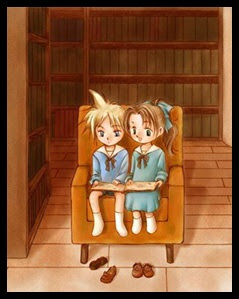Image from Best Fiction Books
Even young children can often memorize poems - especially rhymed verse - for impromptu recitations. As with music, the brain's expectation of a desirable meter and rhyme provides comfort to children when delivered though poetry. Save the unrhymed free verse poems for later. By introducing rhymed poetry during their formative years, parents help develop language skills in their children that will last a lifetime.
Light humorous verse, rather than heavy preachy prose will keep poetry fresh and fun for the kids. However, parents should introduce age-appropriate works and alternate between reading, writing, and performing poetry to add variety to the experience. Young children respond best to short, humorous rhymed verse, while adolescents generally enjoy all forms of poetry, especially works that provide a balanced blend of concrete (grounded in reality) and abstract (figurative speech) thoughts.
Here are additional tips for helping children get the most out of poetry.
Reading for Children Under 10: Beginning at birth, parents should read humorous rhyming poetry using lots of animation in their voices. Sing-song nursery rhymes, collections of funny poems, books by Shel Silverstein, and anything by Dr. Seuss is a good choice. As soon as children can talk, they can describe what's happening in pictures and with book-length poetry can predict what will happen next.
Writing for Children Under 10: Young children can write original poetry in easier forms, such as nature haiku (17 syllables total with three lines broken into 5, 7, 5 syllables each), rhymed couplets, and free verse. Drawn pictures or cutout magazine photographs to illustrate their poems make the work seem like play. Compile the best poems into a hand-written book, a booklet printed from the computer, or arranged into a hardcover book purchased blank from a store.
Performing for Children Under 10: Poetry is written as music without instruments, so children should read poems aloud whenever possible. One enjoyable game is to create an indoor scavenger hunt using rhymed verse as clues. Children read the clues out loud and decipher their meaning. With more advanced children, they can write the clues for others.
Reading for Children Over 10: Parents can revisit the great poets with their children, helping them to appreciate language and meaning. Poets from certain countries (e.g. English poets), time periods (e.g., the Romantic poets), or styles (lyrical vs. narrative poetry) may be the focus of reading sessions. Collections of poetry provide an assortment of styles, subjects, and poets for all ages.
Writing for Children Over 10: Adolescents might be inspired to write poetry about subjects of their own choosing. If they need suggestions, however, parents can recommend writing about their senses, a beloved pet, a favorite sport, or their best friend. Children should write in whatever style they like about whatever subjects they like, but occasionally will benefit from stretching themselves beyond their comfort level. By this stage, some of their poetry may be good enough to submit to publishers or give as gifts to relatives, teachers, and friends.
Performing for Children Over 10: Outgoing adolescents might even enjoy open microphone poetry nights at coffeehouses. Parents should visit these events first without their children to ensure that young adults are welcome in the audience and as presenters. Older children may prefer to merely listen to other poets or to perform on stage with their original work. If these kinds of coffeehouse opportunities don't exist in their area, parents can host their own coffeehouse open mic poetry night at home with family and friends.
The plays and poems of William Shakespeare remain the ultimate poetic challenge for children (and many adults) after they've mastered the basics. Generally, it's best to start children with the sonnets and comedy plays, such as "As You Like It," "The Comedy of Errors," and "Twelfth Night." Parents can buy two copies of the books to read along with the child, and may enhance the experience by watching a movie version of the play on DVD or attending a Shakespeare Festival, if available. The most important part of the experience, however, is creating a lifelong love of poetry in the child.
Article Source: Leslie C. Halpern


0 comments:
Post a Comment